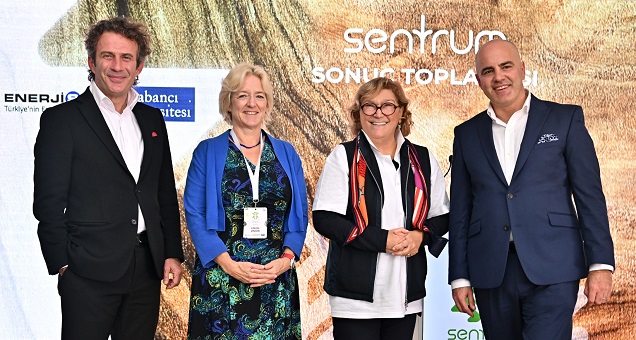Sabancı University, Enerjisa Energy, and the United Nations Development Program (UNDP) have announced the results of the 18-month joint work aimed at creating a green destination model in Küçükköy with energy efficiency, renewable energy, and sustainable tourism practices. Within the scope of the SENTRUM project, which was completed with an investment of 10 million lira, energy studies were carried out for tourism enterprises and public buildings. Energy-efficient lighting and white goods were provided to businesses, solar energy systems were installed in public buildings, and the village became equipped with high-speed electric vehicle charging infrastructure.

Necmi Komili Primary and Secondary School, where energy efficiency and solar power plant applications were realized within the scope of the project, became some of the first "net zero energy buildings" in Turkey.
All these efforts have also produced quantifiable benefits in the fight against climate change. Energy has been saved by preventing the use of 15,000 kg of coal per year in the region with energy-efficient technologies and renewable energy applications under the umbrella of Enerjisa Enerji’s “The Energy of My Work”. In addition, thanks to renewable energy systems, annual carbon emissions of 90,000 kg have been prevented.
The Sustainable Energy Based Tourism Implementation Center (SENTRUM) project reveals in concrete terms how the tourism industry can benefit from renewable energy sources and other sustainable practices in a single destination.
18 months of sustainable energy-based tourism practices and their results were shared in a press conference held with the participation of Güler Sabancı, the Chair of Sabancı Holding Board of Directors and the Founding Chair of Sabancı University Board of Trustees, Kıvanç Zaimler, Sabancı Holding Energy Group President and Enerjisa Energy Chair of the Board, and Louisa Vinton, UNDP Turkey Resident Representative.
Speaking at the press conference of the SENTRUM project, Güler Sabancı, the Chair of Sabancı Holding Board of Directors and the Founding Chair of Sabancı University Board of Trustees underlined that the SENTRUM project, which she called the "Triangle of Success", is an application generating social benefit in cooperation with Enerjisa Enerji, Sabancı University and UNDP. Expressing that the SENTRUM project is a role model in the fields of tourism and energy, which are among the most important sectors for the Turkish economy, and that the success of the project is not limited to Küçükköy, Güler Sabancı said, “I believe that with the spread of the SENTRUM model, which includes scalable, replicable, and sustainable tourism practices, this model will be a success story for both our country and the world. This project, which also serves the "Sustainable Development Goals" determined by the United Nations, is also one of the most concrete examples of the mission of "Being a Pioneer in Sustainable Business", which is one of the five main strategies of the Sabancı Group.”
Louisa Vinton, UNDP Resident Representative, said “Küçükköy is just one of the thousands of picture-postcard locations that make Turkey such a hot tourist destination.” She continued, “But with the growth of tourism comes the risk of environmental damage and increased energy use. This is why UNDP is so pleased to be collaborating to develop a model for green tourism that can ensure economic benefits for the country while protecting the planet upon which we depend.”
Kıvanç Zaimler, Sabancı Holding Energy Group President and Enerjisa Energy Chair of the Board, said, “Our mission at Enerjisa Enerji is to lead Turkey’s energy transformation and assume responsibility for a better future. We aim to create solutions that will enable us to reach sustainable development goals not only with our own resources, but also by engaging other stakeholders in the process. For that very reason, I think that the SENTRUM project, which we launched last year in collaboration with UNDP, and with the valuable contributions of Sabancı University, is very valuable and meaningful.”
Within the scope of the SENTRUM project, tourism resources of Küçükköy and its surroundings were determined in order to create the green destination model, and roadmaps were prepared on green purchasing, sustainable transportation, production, and consumption. Green destination standards in other countries were examined and those that could be adapted to Küçükköy were identified. Alternative cycling and hiking routes with nature and energy themes were created.
With the Sabancı University Creative Technologies Atelier in Küçükköy, 140 people, consisting of high school students, women, and business owners in the region, were provided with training on topics such as energy efficiency, sustainable tourism, waste management, climate change, and gender equality. Within the framework of the gender equality action plan that was prepared, women's participation in the project activities was ensured.
A "Sentrum Coordination Office" was also opened in Küçükköy, where local people, businesses, and visitors can obtain information in order to raise the awareness of all stakeholders on energy efficiency and the use of renewable energy sources.
Building on the Küçükköy experience, the partners in the " triangle of success" continue to work on developing the second phase of the SENTRUM project and implementing sustainable energy and tourism practices in other destinations.
